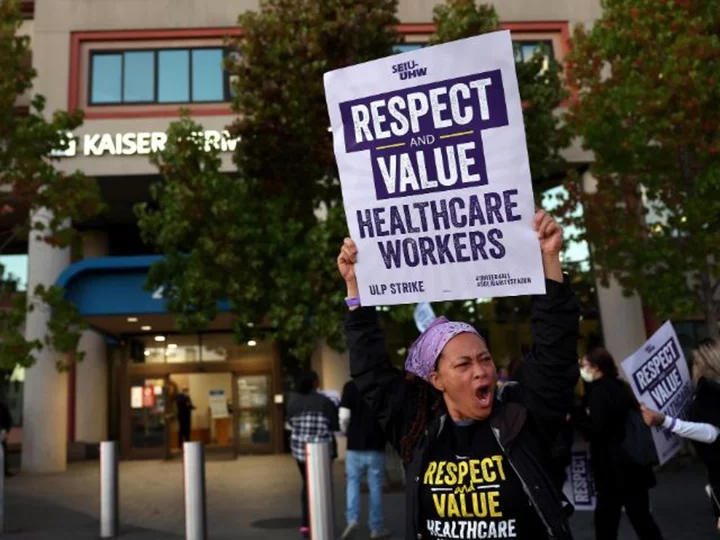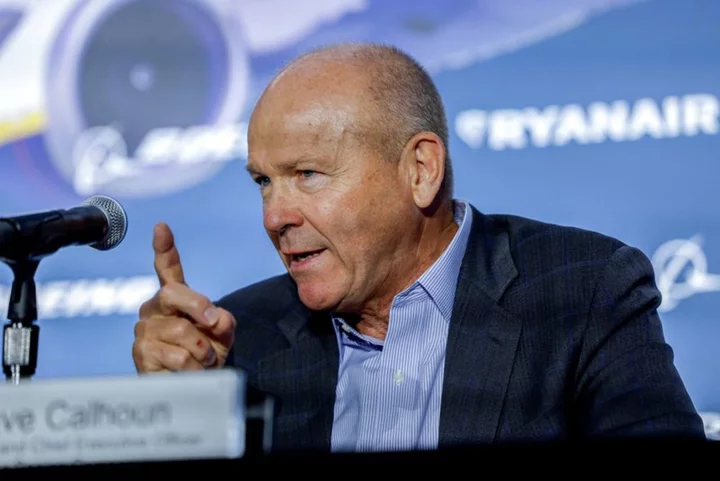The largest health care strike in US history is now in its second day after more than 75,000 Kaiser Permanente workers began walking off the job on Wednesday.
The striking employees, who work across California, Colorado, Washington and Oregon, are represented by a coalition of unions that comprise 40% of Kaiser Permanente's staff. Nearly 200 workers from Kaiser facilities in Virginia and Washington, DC, joined the picket lines for a single day on Wednesday, as well.
The work stoppage is set to end early Saturday morning, but the coalition said it is planning a longer strike in November if a new employment contract is not negotiated by then.
In a statement on Wednesday, Hilary Costa, a spokesperson for Kaiser Permanente, said negotiations between the coalition and Kaiser ended without a settlement, but "a number of tentative agreements in bargaining" have been reached.
However, Caroline Lucas, a spokesperson for the union coalition said in a statement Wednesday that "frontline healthcare workers are awaiting a meaningful response from Kaiser executives regarding some of our key priorities including safe staffing, outsourcing protections for incumbent healthcare workers, and fair wages to reduce turnover."
Striking workers call acute short-staffing 'dangerous'
The union coalition is demanding higher pay among other benefits, including a strategy to fix a chronic staff shortage that workers say has left them overworked and burnt out, especially in the wake of the pandemic. Employees in a wide array of roles at Kaiser are on strike, including nursing staff, dietary workers, receptionists, lab technicians, and pharmacists.
Ju-Anna Isaiah, a ward clerk transcriber for Kaiser Permanente who is on strike in Los Angeles, told CNN she is often the only person manning her unit due to a lack of new hires. Isaiah's role requires her to help coordinate patients' rooms after they leave surgery, including booking beds for patients in intensive care.
"Sometimes our OR [operating room] can be backed up if we can't get patients out of the OR fast enough into the recovery unit," she said. "It's really bad for the front-line health care workers when we're trying to work with the patients and get them to where they need, but we don't have the staff."
Isaiah's complaints echo those of other Kaiser workers on the picket line. The union has called current staffing levels at Kaiser "unsafe," and patient wait times "dangerous."
James Bell, a radiology technologist, described patients getting out of bed after waiting too long to get help from the limited staff on duty, resulting in falls. Some of those patients have come to him for X-rays for those injuries.
In a statement, Kaiser Permanente said that labor shortages are an industry-wide problem.
"Every health care provider in the nation has been facing staffing shortages and fighting burnout. During the Great Resignation in 2021-22, more than 5 million people left their health care jobs across the country. Up to two-thirds of health care staff are saying they are burnt out and more than 1 in 5 are quitting," a spokesperson for Kaiser Permanente said.
Kaiser also said it is doing "aggressive work" to hire more staff members and has committed to hiring 10,000 people in union-represented jobs by the end of 2023.
Picketers describe staff sleeping in cars due to high cost of living
Workers on the picket line argue that Kaiser Permanente would do a more effective job hiring workers if the organization increased employee pay and benefits. According to the coalition, some negotiating progress was made before the strike began, though management and the unions are still far apart regarding employee raises.
Kaiser Permanente has offered location-dependent wage increases, with a maximum of 4% for each of the four years of the new contract, according to an October 1 update by the largest union in the coalition. The coalition rejected that offer, saying such a raise proposal fails to keep up with the cost of living.
Rocio Chacon, a striking Kaiser worker who serves on the union's negotiating committee, said many employees cannot afford to live in the cities where they work due to the rising cost of living, and some workers resort to sleeping in their cars.
"As we speak there are nurses that are sleeping in their cars because of two reasons. One, they can't afford cost of living here so they have to move two, three hours (away) and then because of short staff they're working 14, 16 hours so they're tired," Chacon said. "So, their best choice is to be Monday through Friday in their cars."
In a statement, Kaiser Permanente said it is a leader in pay.
"We lead total compensation in every market where we operate, and our proposals in bargaining would ensure we keep that position," a spokesperson for Kaiser Permanente said in a statement. "In some places, like in Southern California, a Kaiser Permanente employee leaving for a similar job at another organization would on average face a 20-plus percent pay cut and lower benefits."
The unprecedented strike comes at a time of heightened labor activity across the United States, with tens of thousands of workers across multiple industries taking to picket lines for better pay and benefits. In the wake of the pandemic, health care workers in particular have been fighting for safer and more secure work environments. This is the first ever national strike effort at Kaiser Permanente.









